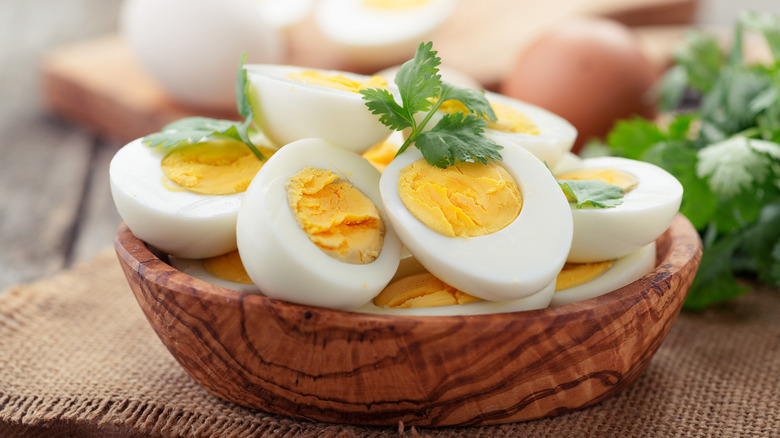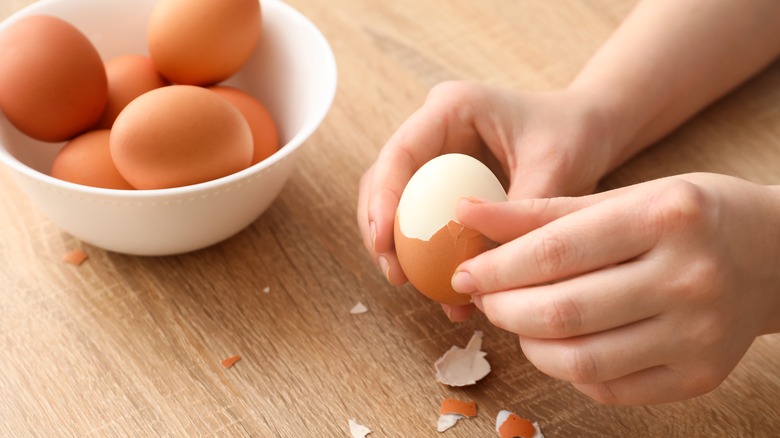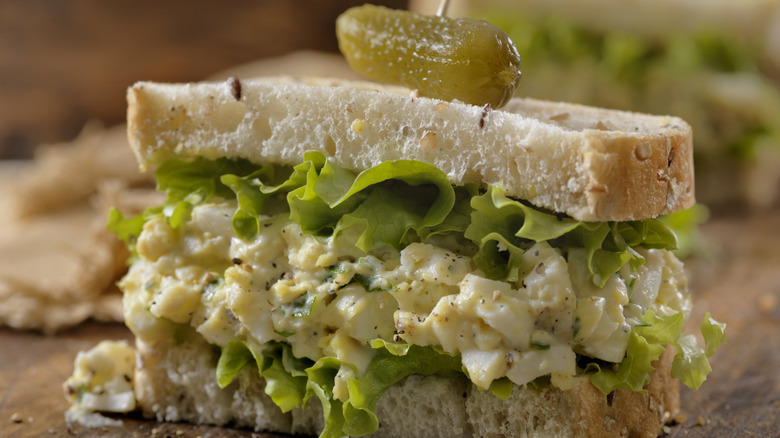The Best Way To Store Peeled Hard-Boiled Eggs
Hard-boiled eggs are one of the best items to meal prep in advance. They are a quick protein boost for salads or soups, and you can make a large quantity of them in mere minutes — especially if you're using the trick restaurants use to peel them quickly. Regardless of how you use this versatile ingredient, you'll want to ensure that you're storing it properly. Improper handling can lead to premature spoilage and food waste, but thankfully, this problem can be easily avoided with just a bit of precaution.
To correctly stow away peeled, hard-boiled eggs, just place them inside an airtight container and transfer them to the fridge. The cool temperatures will slow down the growth of pathogens in your food, which will keep it from perishing early. Since eggs are also absorbent, the sealable jar or bin will stop your eggs from absorbing any strong odors lingering in your refrigerator. Once you've put away your peeled hard-boiled eggs the right way, it's best to consume them within a week. Waiting any longer to eat them puts you at risk of foodborne illness, so don't take any chances and make sure to finish everything within that time frame.
Keep an eye out for spoilage in your hard-boiled eggs
As your peeled hard-boiled eggs sit in the fridge, watch for any symptoms of premature rotting. For this specific ingredient, any signs of discoloration, loss of firmness, mucous coating, or strong undesirable smells are firm indications that spoilage has occurred. This only applies to spoilage-causing microbes, as pathogenic germs such as E. coli or salmonella often do not cause physical blemishes in food.
On that note, there's no need to toss out your food if you only notice a green ring around the yolk. While not pleasing to look at, this discoloration is safe to eat and only happens due to a natural chemical reaction between an egg's sulfur and iron content. Since the phenomenon is often triggered when you use raging temperatures to cook, simmer your water instead of boiling it — it's one of the many tricks to get better hard-boiled eggs.
For a lot of perishable ingredients, freezing remains the best way to extend their life considerably once they can no longer sit in the fridge. The opposite rings true for eggs, as their whites turn tough when exposed to frigid temperatures. However, you can freeze the yolks individually without any problems for your future spreads or deviled fillings.
Other tips for storing peeled hard-boiled eggs
In the case that you don't have immediate access to a fridge, consider transferring the hard-boiled eggs into a cooler or lunchbox with ice packs. Bacteria should be unable to quickly infect your food as long as everything stays under 40 degrees Fahrenheit, making this an excellent way to store this ingredient at work or outdoor dining events. If your lunchbox or cooler can't keep temperatures below that threshold, your hard-boiled eggs should be safe to consume for two hours. If room temperatures are above 90 degrees Fahrenheit, however, you only have 60 minutes to finish everything up.
Regardless of how exactly you (properly) store your peeled hard-boiled eggs, you might need to get creative in order to finish them all up within a week. While this ingredient remains a yummy snack and salad topping by itself, you can really complement its flavors by adding condiments and sauces. For example, you can mix this ingredient with mayonnaise to create a delectable sandwich, or store it over a soy sauce brine to give the eggs an umami edge. Don't be afraid to incorporate it into your favorite foods, as you might just come across a new, original recipe.



